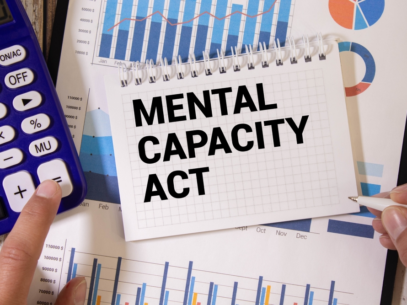26 September 2022
Claire Webster, SCIE Practice Development Consultant
In 2009 I started my Social Work journey in North Yorkshire supporting adults to remain at home for as long as possible. I met people who had lived a long life without drawing on statutory care and support and were coming to terms with a loss of independence and the need to consider care for the first time. I met families who had cared for their loved ones for many years and were struggling with the emotional and physical requirements of the role and needed support. I also met young people who due to an unexpected situation in their life were now calling on care. I later moved to work with people with learning disabilities, Autistic people and people who had been in contact with mental health services.

I’ve supported people to move from residential care into their own home, which came with significant challenges from the care system and clinicians around them, where historical incidents were recorded and left unchallenged for decades and underpinned a restrictive approach to their care. One experience that continues to resonate with me, is where a person who had allegedly set fire to a bin as a teenager, 10 years prior, was moved from his family home to residential care and remained there over 10 years later with a folder detailing ‘risks’ if he were unsupervised.
The person was also repeatedly recorded as ‘lacking capacity’. I presented him with pictorial information about moving home, referred him for an advocate and eventually he began to talk to me about his life and what was important to him. He needed a little support to understand budgeting, but was already working in his local community, we worked together to move him to his own home and I saw his confidence grow. I’ll never forget the day of the move, carrying his treasured fish tank and fish in the car to his new home, but seeing him set his bedroom up, how he finally wanted it. What I have learned is to use my leadership skills as a Social Worker, to spend time getting to know people, the way they want to be communicated with, and help people to speak up using advocacy support and continue to pursue less restrictive care when everyone felt it too risky.
This is the key to preparing for Liberty Protection Safeguards (LPS), recognising what restrictions look like, recognising that even when people are not demonstrating they are ‘unhappy’ with their care arrangements, they still may be deprived of their liberty and have a Right to liberty.
A flourishing life?
Liberty is not an absolute Right, it can be curtailed but must follow a process set out in law (for example, using Deprivation of Liberty Safeguards). But even when a person requires a level of care that amounts to a Deprivation of Liberty, are we doing enough to ensure that restrictions are not just accepted as the status quo? Are we focusing on a person’s need to live a flourishing life?
During the height of the current Pandemic, we all experienced a restriction on our liberty to prevent the spread of an infectious disease. However, once restrictions were lifted, disabled people continued to experience restrictions in their everyday life, including continued restrictions on family visits, leaving their homes and continued requirements to test regularly. Even when blanket restrictions are/were unlawful under the Mental Capacity Act, we continue/d to see evidence of blanket restrictions being applied, particularly around family visits. Disabled people continue to be far more restricted in their everyday life compared to the general public.
Being proportionate
Every practitioner I know has made a decision at some point to provide care to a person who is unable to make the decision themselves (under the Mental Capacity Act). However what is much rarer is naming arrangements when they become a ‘Deprivation of Liberty’ and identifying why those arrangements are both necessary and proportionate.
The State, the local authority, is the servant of those in need of its support and assistance, not their master.Lord Justice Munby A Local Authority v A (A Child)& Anor [2010] EWHC 978
If you are a practitioner and have increased the level of observation a person is subject to, introducing people to their life to provide care, reduced a person’s choices, you need to consider how you are implementing the care in a way that promotes Liberty rather than just restrict. Preparing for LPS involves becoming familiar with Deprivation of Liberty Safeguards now, recognise when you make decisions that impact on a person’s liberty, and record it. Being a Rights based practitioner means challenging the status quo, think outside the box and promote social justice .You don’t have to be an Approved Mental Health Professional (AMHP – Mental Health Act) or Best Interests Assessor (BIA – Deprivation of Liberty Safeguards) to be Rights based, you just have work get to know the people you work with and the impact of your role, and decision making, in their lives.
LPS does not yet have a new implementation date, but there is plenty to do to prepare in the meantime. People don’t want to be over processed in order to access their Safeguards under LPS, we should be looking at how we can incorporate the information into everyday practice, for example as part of Care Act processes. As soon as you determine a person is unable to make a decision about their care and where they live, start to think about how to promote and maintain Liberty throughout practice, keep working to reduce unnecessary restrictions, always ask: Is this Necessary? Is this proportionate?


